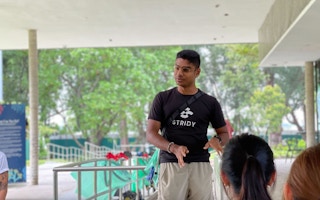Carried by rivers, litter and unmanaged garbage often find its way into the seas. Some of it end up on Singapore’s shores and as Yasser Amin has observed, the trash problem can be “very real”.
To continue reading, subscribe to Eco‑Business.
There's something for everyone. We offer a range of subscription plans.
- Access our stories and receive our Insights Weekly newsletter with the free EB Member plan.
- Unlock unlimited access to our content and archive with EB Circle.
- Publish your content with EB Premium.
When Yasser first joined a beach clean-up initiative in 2020, the facilities and events management undergraduate student at the Singapore University of Social Sciences was shocked to find so much trash, especially plastic waste, on the public beaches.
What he finds even harder to reconcile is that the litter problem happens in other places too, with discarded wrappers, bottles and plastic bags found in the shared spaces that people live in, in a city-state that has branded itself for being clean and green.
“Almost all the litter on our beaches comes from overseas sources…When stuff washes up on our shores, we do our best to clean it up,” said Yasser, who is the chief officer of Singapore-based community clean-up organisation Stridy, based on his observations over the year. “Unfortunately, local littering happens in urban areas too.”
To stop the trash problem upstream where it starts, Yasser believes that the issue of apathy towards the act of littering needs to be addressed, and people need to start appreciating that Singapore is only now kept spick and span because of its large and efficient “cleaning army”. There is a need for collective action on sustainability in Singapore and across Southeast Asia, he says.
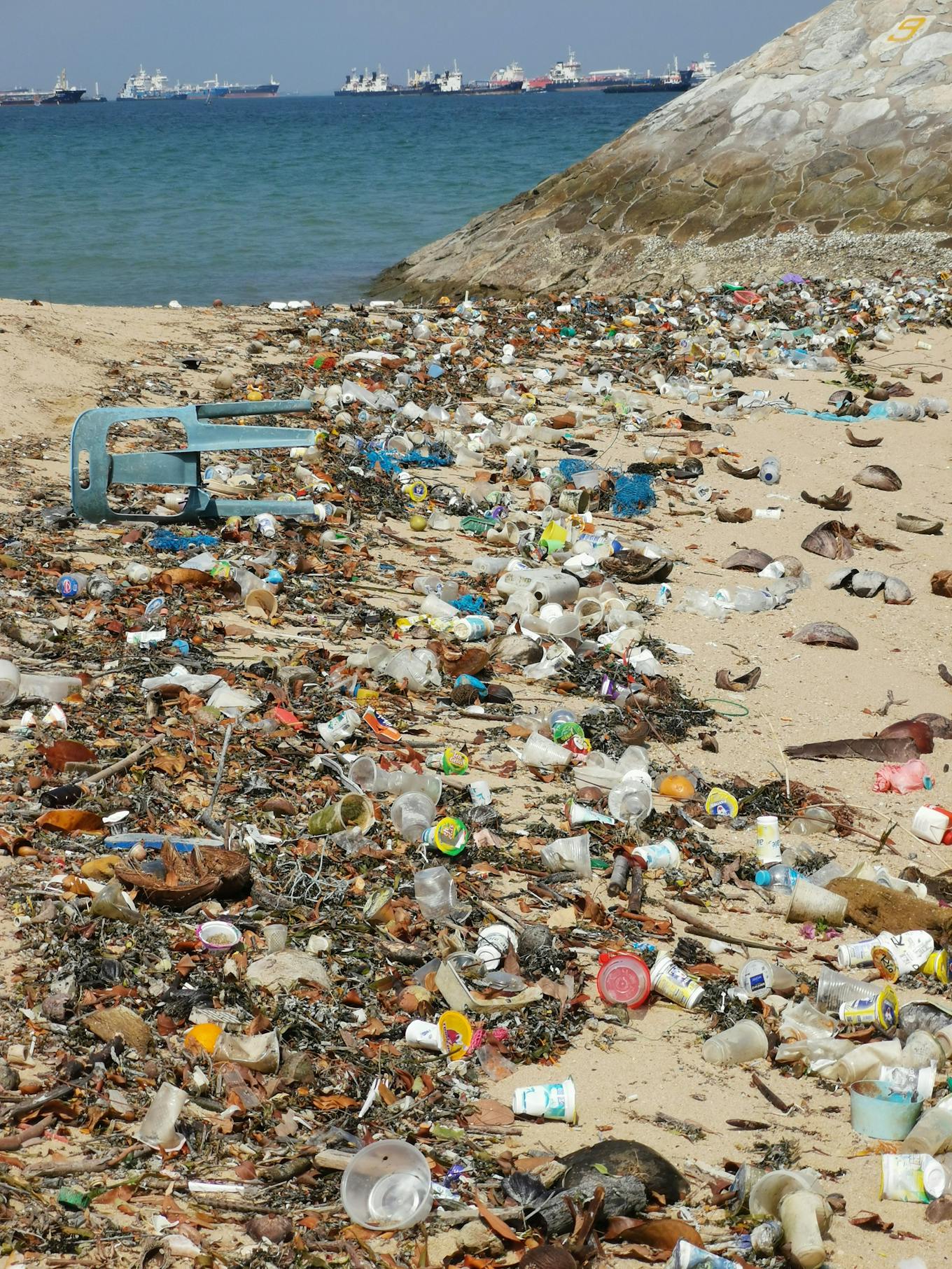
A huge amount of trash that washed up at Area D, East Coast Park, Singapore. Image: Yasser Amin
Stridy volunteers, or “Striders”, aim to do that. Using an application, Stridy offers a solution where data and metrics on how many trash items have been picked up, the type of litter collected, and the distance walked by participants at each clean-up can be easily tracked, which in turn encourages the action to be sustained since results are visible. The app also allows community and connection to be built among fellow “Striders”.
Since its establishment in 2020, Stridy has registered users in 79 countries. Striders worldwide have collected over 630,000 pieces of litter, weighing a total of over 16,600 kilograms. The top identifiable litter tracked by the app is cigarette butts.
Stridy also conducts paid engagements, which provides a source of revenue, with schools and corporates. Major organisations that Stridy have worked with include Google, Standard Chartered, DBS, WWF and Shangri-La Singapore.
“We come in as a subject matter expert, plan and host the clean-up sessions and debrief the participants after the session.” said Yasser on the paid engagements. Stridy also provides the equipment that include “grabbers” – a tool to pick up the litter, litter bags and litter bag rings that are used to keep litter bags open.
In 2023, Stridy conducted a total of 40 open engagement sessions with the public and 64 paid engagement sessions. They recently conducted a “party and tidy” event at two of British band Coldplay’s concerts in Singapore, where participants helped to clean up trash outside the concert venue.
“We started cleaning up as the last two or three songs were being played [at the concert] and stopped the clean-up once people exited [the stadium],” said Yasser, who is one of 10 young sustainability leaders selected for the Eco-Business Youth A-List 2023. “We got a bit of visibility, and the participants who joined us enjoyed their time.”
In this interview with Eco-Business, Yasser shares more about his views on “litter apathy”, his thoughts on 2024 being Singapore’s Year of Public Hygiene, and his advice for youth working in the sustainability sector.
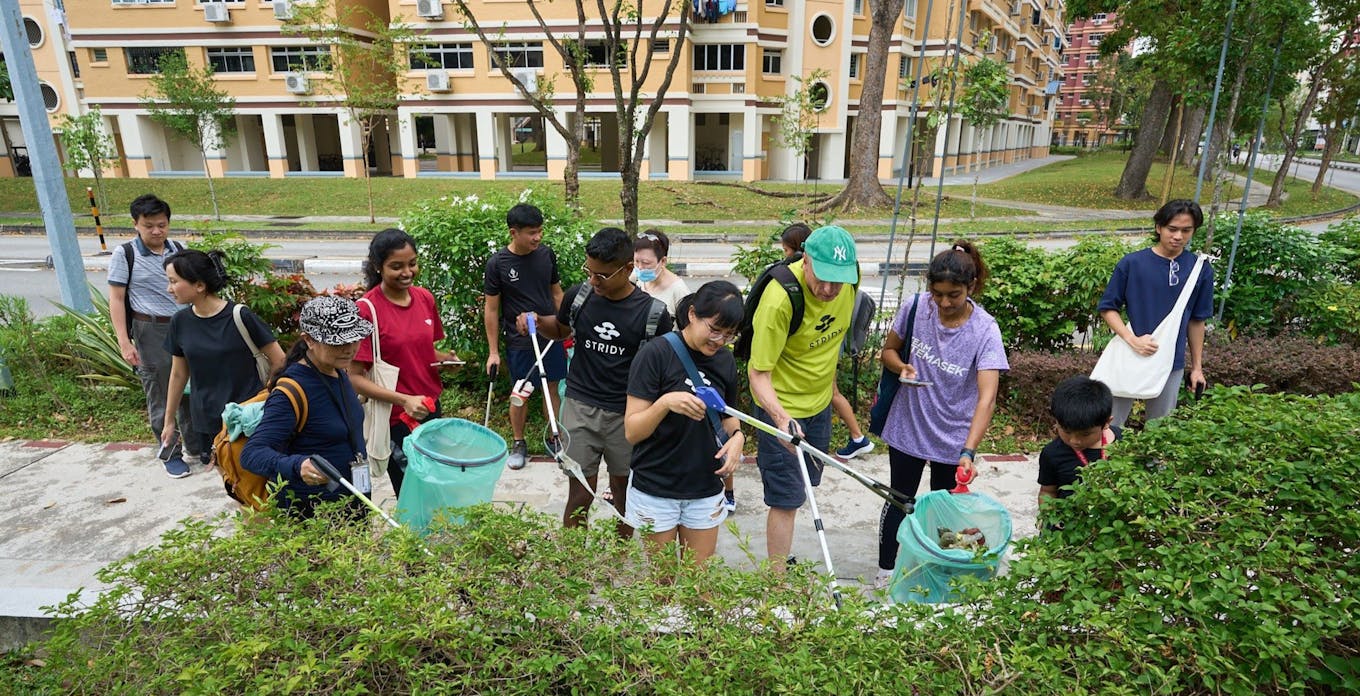
Stridy working with volunteers on a municipal clean-up in a Singapore town. Image: Stridy / LinkedIn
The Singapore government recently announced that 2024 has been designated as the Year of Public Hygiene for the city-state. What are your views on this move?
It is great that agencies such as the Ministry of Sustainability and the Environment are focusing on public hygiene this year. However, I believe it will take more than enforcement and clean-ups to truly tackle local waste management issues such as littering.
It will take infrastructure improvements such as having more well-placed bins and positive signage to encourage people to keep urban areas clean. The government will also need to work with the different town councils across Singapore.
What is often regrettably overlooked by many is also the workload and welfare of the very people who deal with our daily public hygiene: the cleaners. I wonder if the Year of Public Hygiene is also a year when we can spotlight and celebrate these workers who keep Singapore clean. Singaporeans don’t appreciate and celebrate our cleaners enough, but we have every reason to do so.
Ultimately, I hope the announcement means that we give the cleaners recognition. I also hope the demand for litter-picking activities organised across schools, grassroots organisations and corporate organisations increase. And I hope it signals that the government is serious about tackling municipal hygiene issues. I hope they are indeed serious (about it).
Tell us more about the beach clean-ups you do. Where does the litter come from?
Almost all the litter on the beaches, such as in East Coast Park, comes from overseas sources. We are confident in saying this because when we do clean-ups, we see brands and items [among the litter], such as juice cartons from Indonesia that you cannot find on store shelves here. In the north of Singapore, you find litter from Malaysia and fishing areas. But we do not point fingers at other countries and say it is their problem. This is a problem we share in Southeast Asia. When stuff washes up on our shores, we do our best to clean it up.
Local littering happens often in urban areas too, unfortunately. When I first started doing urban clean-ups with Stridy, I had anxiety whenever we had many people joining our sessions because I wondered if that would mean there would be no more litter left to pick up and we would have nothing to do. But I have been proven wrong every time. We always have stuff to pick up, such as cigarette butts and small pieces of packaging, every time and anywhere we go.
There are litter hotspots in Singapore, such as at East Coast Park on the weekends and during the public holidays. A lot of litter in Singapore can also be found at hawker centres, food and beverage outlets and wet markets. The root cause is the high number of single use disposables.
Why do people litter?
I have done clean-ups for the past three years, and I have never seen someone litter in front of me. People litter when other people are not looking, in crowded spaces, or when it is convenient and they are able to do it quickly. There are many laws [against littering] in Singapore and that is great, but enforcement is a whole different issue. For example, if someone visits East Coast Park at 12am or 1am and litters – who is going to stop them?
The answer to why people litter is complicated. In Singapore, people litter not because of a lack of infrastructure, but rather because of the availability of a proper and efficient infrastructure for handling waste. Singapore has a very robust way of managing trash. We have incinerators, and we put two islands together to create the world’s first offshore island landfill.
The waste management system in Singapore is so efficient and convenient that everything just works. We have a small army of 59,000 cleaners. While all of this is a good thing, it has also become an issue. This efficiency leads to negligence and apathy [among the population]. People litter because they expect that there will be someone cleaning up after them. But most Singaporeans do not litter, there are just a few bad apples.
Doing clean-ups is great, but you are picking up after people. How do you change mindsets and get people to stop littering in the first place?
At Stridy, our long-term vision is to help build a world without litter. Our proposed means to that end is to get people to go out and do clean-ups, but we also realise that clean-ups are not the solution.
When I first started doing clean-ups, I stumbled across a Malay saying that goes “Tak kenal maka tak cinta”, which means “you cannot love what you do not know”. During each cleanup, I make it a point to build appreciation and familiarity among the participants about the environment, so that they will naturally want to protect it.
Unfortunately, many Singaporeans do not appreciate the natural environment. Whenever we host clean-ups, our number one goal is to make people realise that we have nice places that we want to keep clean, and our second goal is to make them realise that we have a littering problem at these places. At every clean-up, many people also say they did not realise there was this much litter.
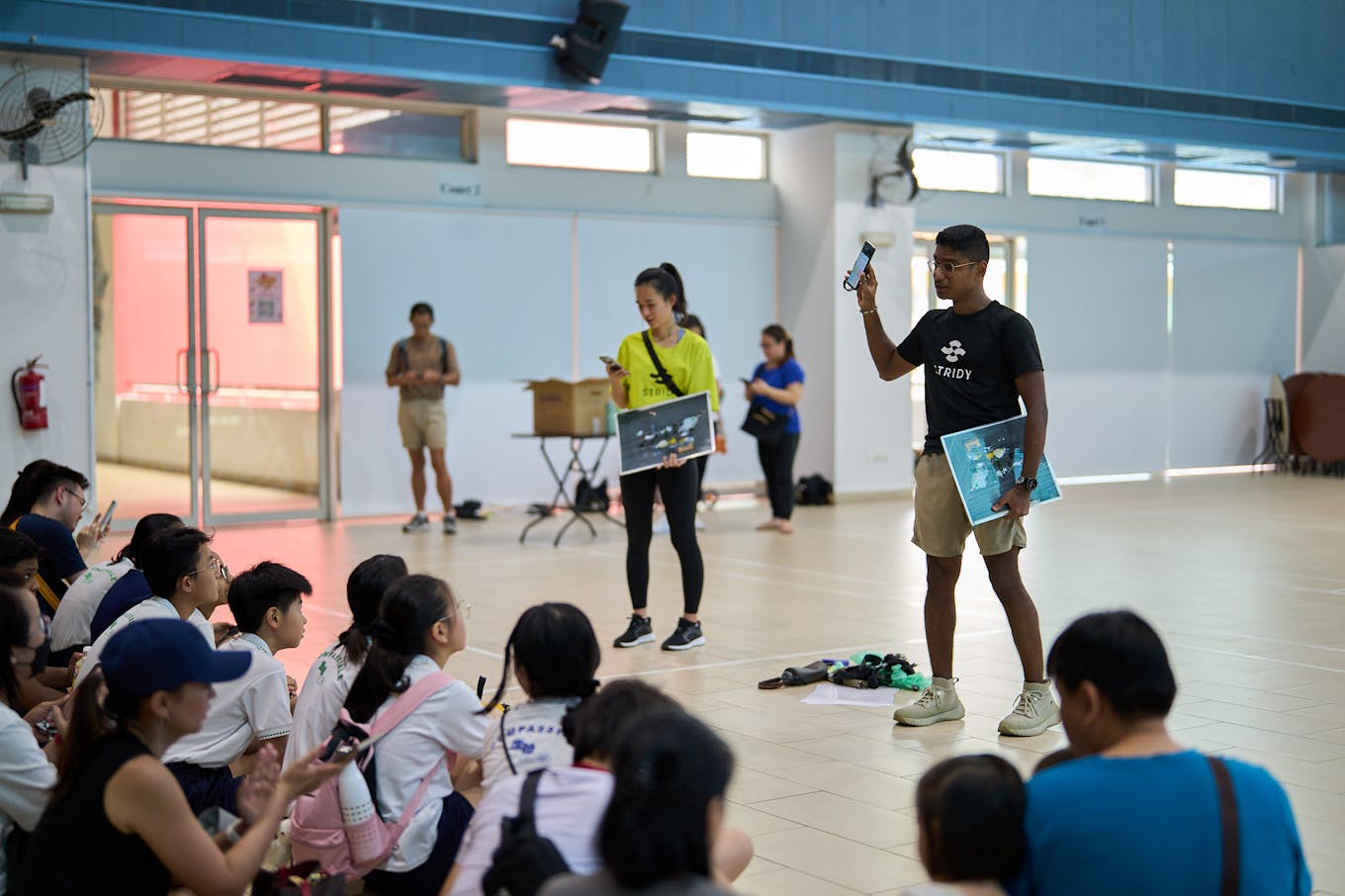
Yasser Amin debriefing students and community residents after a public clean-up event. Image: Yasser Amin
What are some key milestones that Stridy has reached? What are some of your future targets?
We realised that open engagement with the public was more effective in galvanising people to do their own clean-ups. So late last year, we focused our attention on Fernvale, a neighbourhood in Singapore, and got more residents there to do clean-ups. We built a “tool pod” in Fernvale, which would house tools [such as grabbers, litter bags and litter bag rings] used by Stridy. This would make it easier for residents to access the equipment to conduct clean-ups.
We obtained funding from a community centre that enabled us to build the “tool pod” and Fernvale is our first case study in which we see evidence that residents can organise their own clean-ups on a regular basis. It is amazing, and just what we want to achieve. That was a milestone.
We want to scale our efforts in 2024 and have three or four more communities like Fernvale in Singapore.
What advice do you have for young sustainabiity practitioners?
In Singapore, a lot of people are afraid to connect with other individuals and organisations. But we have so many organisations and individuals doing amazing work in sustainability and conservation. There are a lot of opportunities for internship and volunteering in Singapore, and that is something I want the youth here to understand.
My advice would be to seek out other individuals and organisations and to always do things collaboratively. We are not going to get anywhere working in silos. The reason I have gone so far is because I work with other people. I have friends in the sustainability space and having that “tribe” has helped me a lot. I would not be able to do my clean-ups without other people joining me.
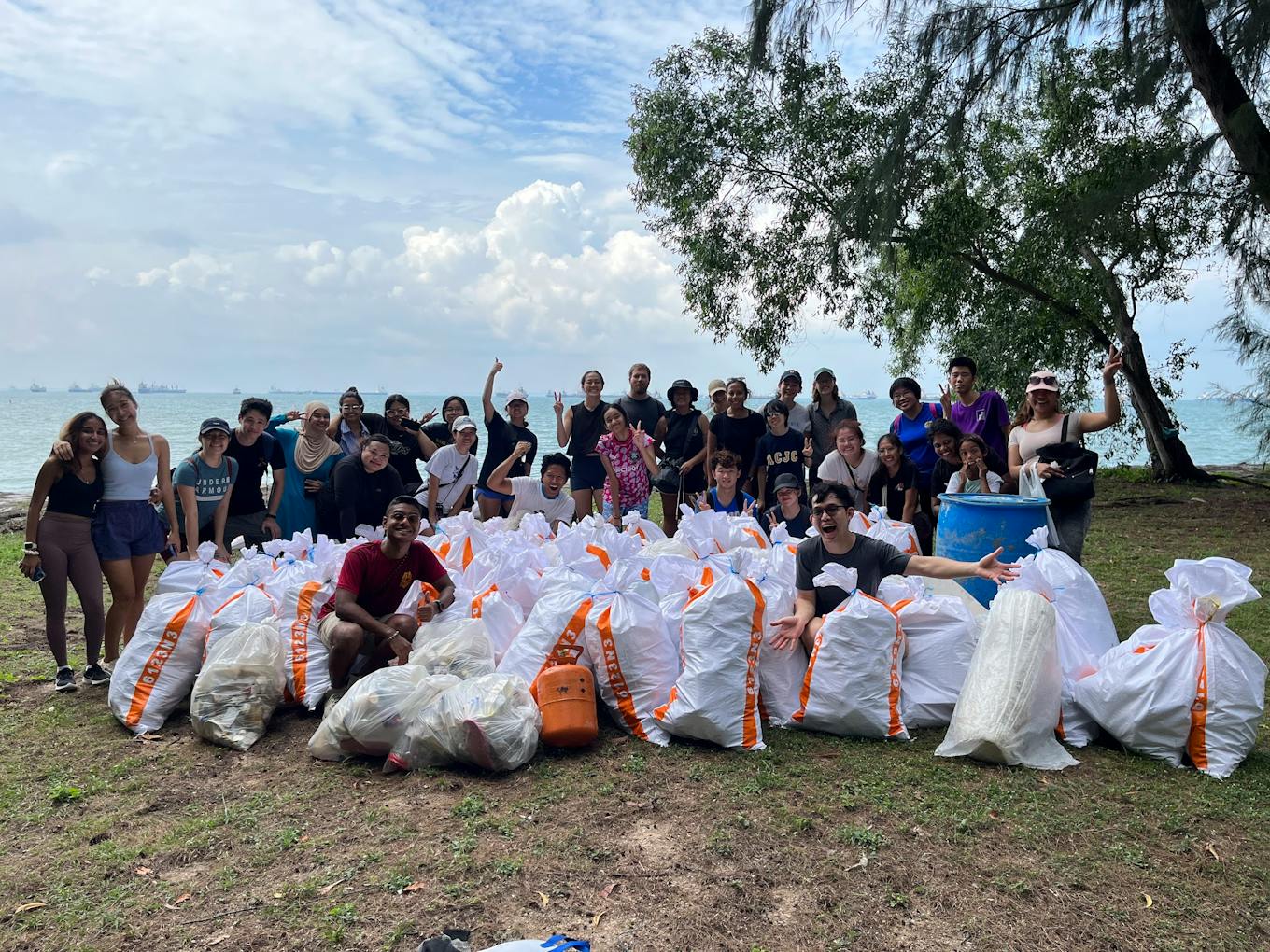
Participants with the litter collected at a clean-up event organised by Yasser Amin at East Coast Park in 2023. 320 kg of trash was collected. Image: Yasser Amin
What is the hardest aspect of your job?
People have taken to calling me “Mr. Stridy”. It is flattering to be honest, but it can be tiring to carry that role all the time. Although my role at Stridy has flexible working hours, often I find myself doing work at night such as replying to messages and sending e-mails. I also work on weekends sometimes when we have engagements with corporates and schools. It was hard at first but now I am used to it.
What is the one thing that inspires you to keep pushing on?
It is the people. Everytime I do a clean-up - be it a paid engagement or an open one where members of the pubic can join - I connect with new people. I remember how my first clean-up introduced me to the need for sustainability, and I see that happening with the new participants that join the clean-ups. That is really satisfying and keeps me going. Many of the people I have met through clean-up sessions are now doing amazing work in the sustainability space in Singapore. Some of them are dear friends. They have been the support structure that have helped me carry on doing my work. Sometimes it feels lonely having to struggle with eco-anxiety, but knowing that other people are going through the same journey as I am, and being able to meet them and talk to them [about the struggles we face] has helped me to push on.
This interview has been edited for clarity and brevity.
Yasser Amin was one of 10 young sustainability leaders selected for the Eco-Business Youth A-List 2023. Read our stories with the other winners here.

